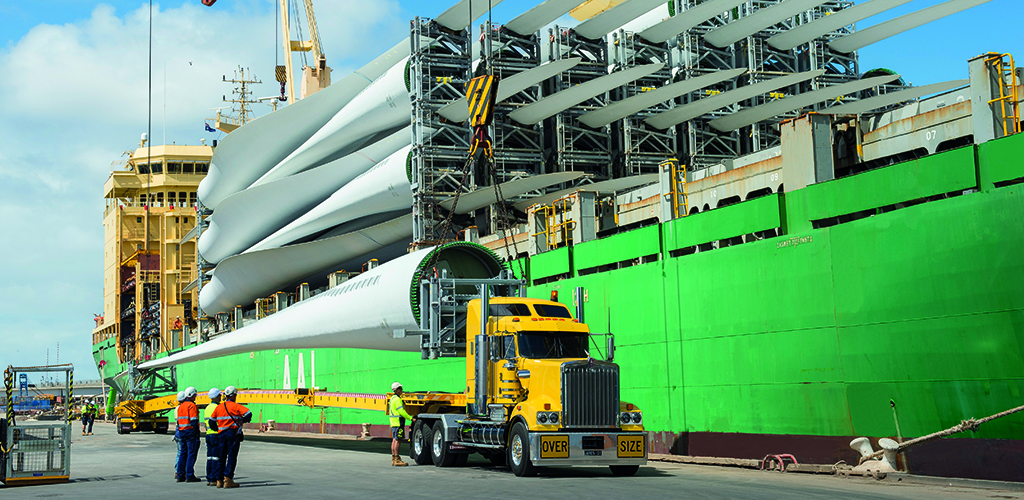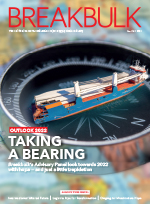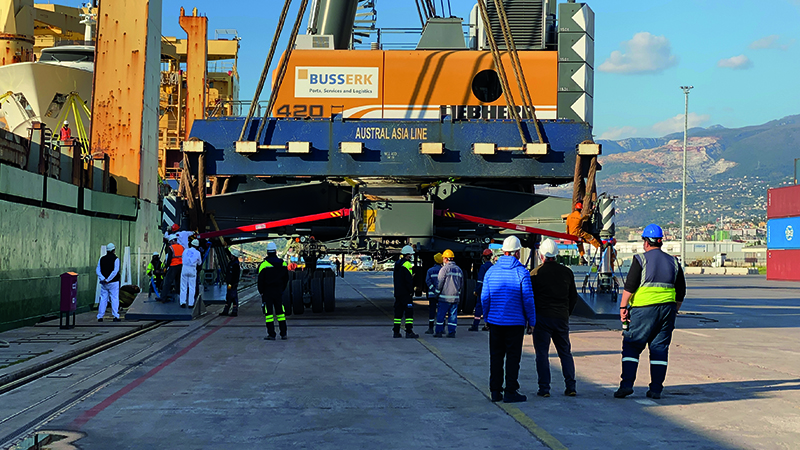Nov 04 | 2021
Altered Future in Post-pandemic World

By Carly Fields
 Multipurpose ships booked out to mid-2022, hyper-inflated freight rates and a new wave of container clients with different demands have all combined to put pressure on relationships throughout the project cargo supply chain. Intermediaries – carrying the weight of that burden – are sprinting to maintain some sense of normality as they strive to meet everyone’s needs.
Multipurpose ships booked out to mid-2022, hyper-inflated freight rates and a new wave of container clients with different demands have all combined to put pressure on relationships throughout the project cargo supply chain. Intermediaries – carrying the weight of that burden – are sprinting to maintain some sense of normality as they strive to meet everyone’s needs.Sharply rising shipping costs have brought volatility and unpredictability for ocean freight capacity to the market. This has impacted every aspect of the global supply chain, not only in high-value and complex projects, but also in the lower-value retail and manufacturing sectors, pointed out Tim Killen, executive vice president of deugro group. And commercial volatility has combined with a lack of available vessel space to hit operational performance.
With new build capacity not expected to supplement existing supply until late 2022, Killen expected freight rates would continue to push new highs this year and will likely remain above pre-pandemic levels in the longer term.
 “This unprecedented change means that we will need to continue to change the way that we work within the project cargo industry. Working across the supply chain both with clients and carriers to increase lead times for planning and scheduling shipments and building more commercial and operational predictability to be able to plan, collaborate and optimize project cargo to meet new budgets and construction schedule requirements.”
“This unprecedented change means that we will need to continue to change the way that we work within the project cargo industry. Working across the supply chain both with clients and carriers to increase lead times for planning and scheduling shipments and building more commercial and operational predictability to be able to plan, collaborate and optimize project cargo to meet new budgets and construction schedule requirements.”Forwarders and agents not only need to appreciate the changing needs of clients and the impact on partners, they also need to adapt to these challenges and design new tangible, value-added solutions. “The last two years have proven that anything can happen, and as a project freight forwarder we need to remain agile in our decision-making and continue to provide the industry with innovative solutions that reduce supply chain risk and costs, while ensuring the highest level of QHSES.”
Who's the Boss?
The client base itself has also transformed, with traditional multipurpose intermediaries finding themselves at the sharp end of the container trade this year. Marc Willim, general manager chartering at AAL Shipping, describes the wave of new clients that have emerged over the past 12 months as “less to do with Covid-19 and more the container capacity shortage in 2021.” He noted that the container segment is “very different from the traditional MPV markets we have served, in that the immediate shortage of space and tonnage has ‘lit a fuse’ under negotiations with container lines and container shippers – effectively shortening negotiation times and driving out spot bookings in favor of longer-term contracts of affreightment.”
 Client demands have shifted too. Killen relayed how the pandemic saw project clients home in on maintaining planned and safe logistics operations in order to meet the schedules and budgets established before the pandemic started. “The focus was on ensuring security of supply, managing QHSES and providing business continuity and capacity through one of the most challenging periods in recent history.”
Client demands have shifted too. Killen relayed how the pandemic saw project clients home in on maintaining planned and safe logistics operations in order to meet the schedules and budgets established before the pandemic started. “The focus was on ensuring security of supply, managing QHSES and providing business continuity and capacity through one of the most challenging periods in recent history.”Thomas Skellingsted, vice president and global head of 4D, agreed that client demands have evolved to overcome reduced sailings, less availability and higher prices. Clients are now seeking “commercial assurance for their projects, to try and ensure that they can be executed in line with the budgets created before and following the Covid-19 pandemic.” Secondly, clients are demanding more operational and schedule visibility and assurance in order to overcome the impacts faced.
Thirdly, Skellingsted said, the focus also remains on providing safety and security for all workers during the planning execution activities of global projects, along with ensuring both the physical and mental well-being of people is maintained. “This has been, and will remain, a major challenge at a time when global mobility and availability of experienced personnel has been significantly impacted by the pandemic and current market conditions.”
Importance of Relationships
Maintaining relationships with intermediaries, albeit virtually, has been paramount over the past 24 months. Willim said that relationships have stayed “remarkably strong,” even if the mode of communication has changed. “We have got to know and work with a large cross section of forwarders and other types of intermediaries and shippers trading multipurpose, steel and dry bulk cargo between these regions. As of today, nothing has changed in the market dynamic to impact these relationships or essence of doing business – whether our counter parties are intermediaries or cargo owners.”
 However, change is on the horizon. With MPV tonnage booked to the middle, and in some sizes to the end of 2022, Willim expects to see a “tightening” of relationships as the fight intensifies for the available space. This, he says, will be especially true on high-demand trades, like Asia outbound to U.S., Europe and Australia – trades that AAL serves regularly. And while a significant portion of the MPV fleet is serving the container trades, Willim said that AAL is still prioritizing breakbulk and project heavy-lift cargoes.
However, change is on the horizon. With MPV tonnage booked to the middle, and in some sizes to the end of 2022, Willim expects to see a “tightening” of relationships as the fight intensifies for the available space. This, he says, will be especially true on high-demand trades, like Asia outbound to U.S., Europe and Australia – trades that AAL serves regularly. And while a significant portion of the MPV fleet is serving the container trades, Willim said that AAL is still prioritizing breakbulk and project heavy-lift cargoes.Forwarders need to up their game to meet this “tightening.” Deugro is banking on diversification strategies in the changing industries and geographies it covers, and also with regards to the services provided to its clients. “Thinking outside the box of traditional project freight forwarding, we have invested in new assets and facilities, a global transport engineering business, supply chain consultancy specialist as well as online continuous professional development training tools,” Killen said. Looking beyond the pandemic, these diversification activities have given deugro strength and added depth to its toolbox, he added.
Pillars for Success
Killen added that the three key pillars for project logistics success have always been people, processes and systems.
“So, we must ensure that we invest and continue to develop and improve in these three critical areas of importance.” deugro follows a six-step project risk assessment to assess the needs of a project and develop safe and secure project logistics solutions. This risk assessment process includes detailed investigations into major factors that are critical to designing and delivering economic, safe and efficient risk planning and execution for complex project cargo movements.
The six steps are:
• Cargo details.
• Required resources.
• Infrastructure assessments.
• Governmental and regulatory requirements.
• Legal and regulatory (including CSR).
• Environmental and sustainability.
“The challenges that the market has experienced over the last two years – including Covid-19, carbon reduction, cargo space constraints and the exciting investment in the energy transition – require us all to be able to react quickly and flexibly to dynamic challenges, and the investment and development of our teams will become even more important in the future,” Killen said.
Ulrich Ulrichs, CEO of BBC Chartering, would like to see the way forwarders select operators evolve. He called for an improvement in and/or development of due diligence on the ability of carriers to perform what they promise, and asking that forwarders “make sure they partner with reliable carriers with proven track records and HSEQ routines.”
With all the existing and mounting pressures on intermediaries, is it inevitable that the sector will see more mergers or collapses of forwarders or agents? Possibly, Killen said. “The current global unpredictability, along with financial and contracting risk pressures, will likely have an impact throughout the supply chain and will hit both manufacturing and logistics service providers. Rising commodity and logistics costs are already affecting the industry.” Couple this with the global focus to move away from traditional oil and gas projects, diversifying energy demands and low-carbon green energy technology investment, and the future of the project logistics industry is uncertain, he said. “This could place major risks on the logistics and supply chain sector, since traditional business models and services may no longer be viable to secure the necessary financial rewards seen in the last decade.”
But it’s not all doom and gloom. Killen described the freight forwarding industry as resilient and adept at re-invention. So, while there may be further mergers and acquisitions – and a concomitant change in operating models – experienced personnel will still be needed at the heart of the industry to navigate through these waters, he said.
Sidebar: Enablers of Project Logistics
Immediate visibility, predictability, transparency, integration ... these are no longer luxuries for the services provided by intermediaries; they are essential and enablers for joined up project logistics.
 4D’s Vice President and Global Head Thomas Skellingsted said it is increasingly common to see IT solutions for the planning, budgeting and movement of project cargo.
4D’s Vice President and Global Head Thomas Skellingsted said it is increasingly common to see IT solutions for the planning, budgeting and movement of project cargo.“Today, project clients have a higher demand for end-to-end transparency of both their inbound and outbound supply chains in order to support data-driven decision-making for their procurement, manufacturing and consolidation activities. Therefore, the need for integrated IT solutions is paramount, providing more detailed KPI reporting to enable confident data-based decision-making to be made by our clients within project freight forwarding activities.”
deugro group’s Tim Killen sees integrated digitalization tools as a “critical requirement” across the supply chain. “The benefits in operating with integrated IT systems also allow us to be able to better plan, schedule and operate with clients or partners, to work more efficiently and effectively on all aspects of logistics from procurement to inspection, consolidation and document management.”
But with this increased dependency on integrated technology comes the specter of cyberattacks. “The reality is that this threat is a critical risk to our industry and requires us to invest heavily in this complex matter to ensure we have strong protocols and systems to minimize the risk of business interruptions and loss of key global data,” Killen noted.
deugro commissions internal and external security penetration tests by specialist security firms and organizes regular cyber training sessions and exercises for its staff.
Carly Fields has reported on the shipping industry for the past 21 years, covering bunkers and broking and much in between.
PHOTOS:
Photo 1: Relations with intermediaries have been thrown into sharp relief by the pandemic. CREDIT: AAL SHIPPING
Photo 2: Tim Killen, Deugro
Photo 3: Marc Willim, AAL Shipping
Photo 4: Forwarders and agents have had to adapt quickly to challenges and design new tangible, value-added solutions. CREDIT: AAL SHIPPING
Photo 5: Thomas Skellingsted, 4D
